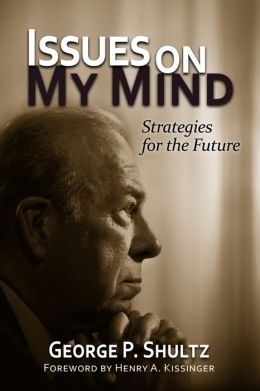- Education
- Economics
- International Affairs
- US Foreign Policy
- Law & Policy
- Regulation & Property Rights
- Politics, Institutions, and Public Opinion
- Health Care
Editor's note: The following essay is the first in a seven-part series of excerpts from George P. Shultz's new book Issues on My Mind: Strategies for the Future. Over the next four weeks, Defining Ideas will feature these short excerpts from the book, accompanied by video interviews of Secretary Shultz.
My days of public service, after two and a half years as a US Marine in the Pacific during World War II, span three administrations—those of Eisenhower, Nixon, and Reagan—and include four cabinet positions: secretary of labor, director of the Office of Management and Budget, secretary of the treasury, and secretary of state. Throughout my years in government, and continuing through my careers in business and academia, a number of vital issues have been persistently on my mind.
This book contains my thoughts about six of these central issues, including comments I have made about them in speeches and publications over the past half century.
The result is basically a how-to book. It offers thoughts on how to: do a better job of governance; get our economy back on track; take full advantage of current prospects for twin revolutions in the field of energy; take on the debilitating problems associated with addictive drugs; conduct an energetic, professional, and tough-minded diplomacy; and confront the security issues posed by nuclear weapons.
We now face these difficult issues at a particularly challenging time. We have moved from a period when we in the United States took the lead role in the construction of a global economic and security commons to a world that is awash in change. We must identify constructive ways to influence the changing world for the well-being of the United States as well as for the benefit of all.
An Economic and Security Commons
As World War II was drawing to a close, a group of gifted and creative people from the United States, Great Britain, and other Allied countries gathered to plan for the future. They reflected on the events of the first part of the twentieth century: two world wars, the first ended with a vindictive treaty and both with immense casualties (around 70 million people, civilian and military, in World War II alone), the Holocaust, and the Great Depression with the accompanying explosion of protectionism and competitive currency devaluations. Seeing this, and recognizing that the Soviet Union was an aggressive and dangerous adversary, this group realized the urgent need to construct a different kind of world.

It was in this environment that there emerged the concept of containment, the establishment of NATO, and the creation of the General Agreement on Tariffs and Trade (GATT) with its rounds of agreements lowering barriers to trade. In addition, the International Monetary Fund (IMF) was established to deal with currency issues and the International Bank for Reconstruction and Development (now the World Bank) was founded to deal with the development needs of devastated countries and, subsequently, the needs of countries with low per-capita incomes. This era also led to the formation of the United Nations to help preserve the peace and support the emergence of the European Community.
These developments resulted in what could be called a global economic and security commons in which the United States took the lead and its allies—and, eventually, its reconstructed adversaries—played strong roles. The creative contributions to these efforts by the Truman and Eisenhower administrations extended, with a few dips and valleys, through the end of the Cold War in the 1990s, at which time Russia began to take part in the global economy. China and Russia have now become members of the World Trade Organization. I was proud to play a part in this process as a cabinet member in the Nixon and Reagan administrations.
The establishment and strengthening of the global economic and security commons has been beneficial for the United States. These decades have also seen unprecedented improvement in the human condition on a global scale. Poverty has been reduced and many people enjoy better health and longer lives, due in some considerable part to breathtaking biological research and the development of pharmaceutical products and innovative medical procedures, many of them emanating from the United States.
But now we are once again living in an age of remarkable changes of enormous proportions that affect every part of the globe. This age calls for a renewed effort to understand these developments and to recreate a global economic and security commons that will benefit us as well as the rest of the world. The changes we face are real and the risks of a chaotic world are high. Serious progress must be made in addressing each of the issues discussed in the chapters that follow. The United States must once again demonstrate its capability and willingness to take the lead.
















